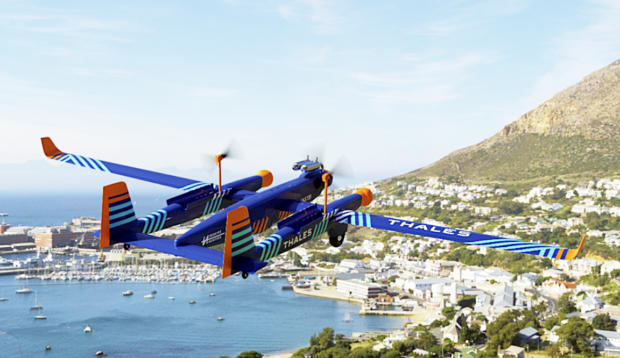Thales is currently developing the UAS100 drone system designed to perform long-range inspection, surveillance and alert missions for industrial, civil and homeland security users. The ScaleFlyt avionics solutions contributed to the safety of a full drone system which recently received the first full Design Verification Report for drone operations to be granted by the European Union Aviation Safety Agency (EASA), a key step on the path towards certification of the UAS100.
Launched in 2020, the UAS100 programme is built around a platform developed in partnership with light aircraft manufacturer Issoire Aviation. Unveiled at last year’s Paris Air Show, two versions of the drone are due to be launched in the coming months: the larger UAS100-10 model, referring to its 10-kilogram payload capacity, with a wingspan of 6m70 and an endurance of 6 hours; and the smaller UAS100-1, capable of carrying a 1-kilogram payload, with a wingspan of 3m35 and an endurance of 2 hours.
The system will be ideally suited to a wide range of missions, from monitoring sensitive areas, inspection and maintenance of infrastructure (pipelines, roads, railways, etc.), risk detection (fires, threats, etc.), and search and rescue operations. In addition to providing a high degree of agility and operational efficiency, the use of drones significantly reduces the environmental impact of these activities, with the UAS100 targeting a 30-fold reduction in fuel consumption compared to the use of helicopters for similar missions.
ScaleFlyt on Board
Thales’s UAS100 offering is also paired with the ScaleFlyt suite of drone solutions, including Avionics, Remote ID, Smart Router, Antijamming and Digital Platform capabilities, the latter of which enables precise pre-mission preparation and real-time tracking during operations.
These solutions were embedded as-is on the AVEM 300, offering a secured drone system that received the full EASA Design Verification Report (DVR) for SAIL III drone operations. The new process established by EASA allows the granting of UAS (Unmanned Aircraft System) design approvals for medium-risk drone operations within the categories identified as Specific Assurance Integrity Levels (SAIL) III and IV.
The relevant category associated with the use of a drone is determined as part of a Specific Operations Risk Assessment (SORA). Low-risk operations require only a declaration by the applicant, medium-risk operations now require the DVR stamp, while high-risk operations require an EASA Type Certificate similar to that for manned aircraft.
An Incremental Certification Approach
Ultimately, the missions to be performed by the UAS100 correspond to SAIL IV (for the UAS100-1) and SAIL VI (UAS100-10), with additional criteria to be assessed in areas such as cybersecurity, structural analysis, common environmental qualification strategy, etc. This initial DVR approval represents an essential first step in the phased, incremental approach that Thales is taking towards full certification of both versions of the UAS100 drone system.
Future progress will also be made through the partnership agreement recently signed by Thales and Centaurium UAS to carry out a test campaign with a view to authorising the use of the UAS100 drone for long-range operations in Switzerland. Centaurium UAS, a subsidiary of the Swiss Centaurium Group, a specialist in helicopter operations, will be responsible for the drone qualification flights and plans to offer Swiss authorities and industry players drone services with optimised operating costs and environmental impact.
With the UAS100-1 set to enter the market in 2025 and the UAS100-10 to follow in 2026, the future looks bright for Thales’s high-potential long-endurance drone programme, ideally tailored to provide safe operations that deliver services with lower costs and environmental impact.
Source: Press Release

